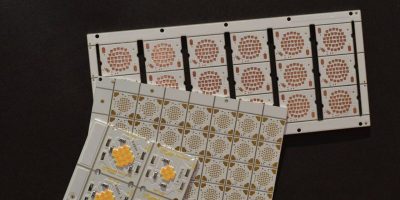Metal-clad PCB is thermally-efficient for lighting
Claiming a technological breakthrough, Cambridge Nanotherm has introduced the metal-clad printed circuit board (MPCB), describing it as the most thermally efficient and most cost-effective MCPCB for the general lighting market.
The company’s patented electro-chemical process creates a 20-micro-thick dielectric layer of alumina atomically bonded to the aluminium board. This, says Cambridge Nanotherm has been able to “radically drive down the cost” of Nanotherm MCPCB, but with better efficiency than other MCPCBs on the market. Samples are available immediately.
Nanotherm MCPCB offers an industry-leading thermal efficiency of 120W/mK, says Cambridge Nanotherm. It offers electronics designers better than 56 per cent of the thermal conductivity of an aluminium plate. Nanotherm MCPCB also offers a robust stability at an operating temperature of 130 degree C, and is lead-free solder- compatible and ROHS- and UL-recognised.
This price reduction brings Cambridge Nanotherm’s ceramicised aluminium boards out of the range of high-power applications into the realm of general lighting applications for the first time, says the company.
It is possible for Cambridge Nanotherm to easily ‘swap in’ its thermal management technology to customers’ existing MCPCB machining processes, although it is also dominant in integrating CSP designs into tuneable white solutions, with no costly retooling.
Nanotherm MCPCB is now available for prototyping and mass production orders. Industry-standard copper finishes, solder mask and feature sizes are all available — as are double-sided substrates containing a dielectric surface and wiring traces on both sides of the MCPCB.
Cambridge Nanotherm manufactures efficient thermal management technology for high-powered electronics. A patented electro-chemical oxidation (ECO) process creates a super-thin nanoceramic layer on the surface of aluminium to form a dielectric with high thermal conductivity. This combination of the industry’s thinnest dielectric with the highest thermal conductivity yields the lowest thermal resistance adds Cambridge Nanotherm.
Cambridge Nanotherm’s thermal management technology provides the foundation for applications ranging from LED packaging and modules, to automotive and power electronics applications.
Cambridge Nanotherm was set up in 2010 to commercialise the electro-chemical oxidation process with innovative IP, and is backed by Enso Ventures.




